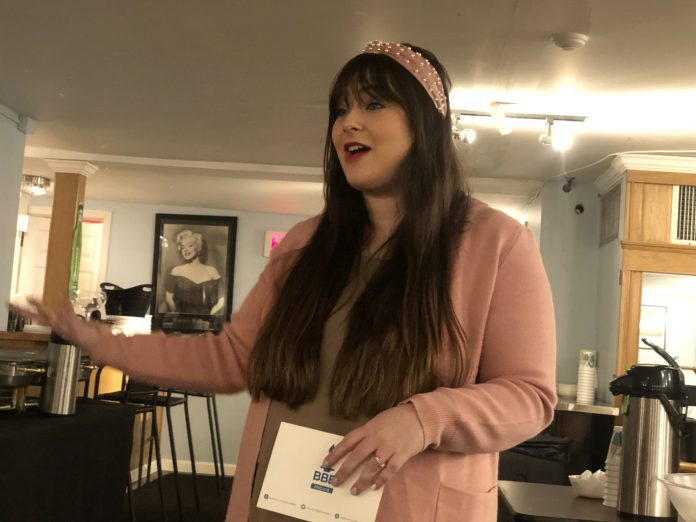BURRILLVILLE – From robocallers and identity thieves, to fraudulent advertisers and businesses that don’t deliver on promises, the Better Business Bureau has worked to educate and protect consumers for more than 100 years, but many people aren’t aware of all of their programs and services.
With speaking engagements across New England, BBB Community Relations Manager Amy Schram aims to change that.
Schram was the guest speaker at the Burrillville Lions Club meeting this week, part of educational series every third Wednesday of the month, where the public is invited to join the group in the lower level of Uncle Ronnies Tavern.
A non-profit organization formed in 1912 to address truth in advertising, the Better Business Bureau now keeps a database of 5.5 million businesses, using a grading system, with the stated mission of increasing marketplace trust.
BBB, Schram said, aims to act as a middle man in resolving disputes between consumers and businesses, with a website and hotline where victims can file complaints.
“We do handle complaints all day, every day,” said Schram, noting that calls to the local division at 508-652-4800 are answered from 9 a.m. to 3 p.m., Monday through Friday. All calls, she said, are returned within 24 hours. “They can answer any question you might have about a business.”
The organization also maintains the “Wise Giving Alliance,” where potential donors can check if charities are legitimate.
To provide information on scams, fraud and identity theft, BBB has the Scam Tracker, a place to report fraudulent activity, even if you weren’t ultimately a victim. There, people are invited to report names, phone numbers and details on potential offenders.
“Any piece of information you can share is incredibly helpful,” said Schram, noting that in 2018, the organization received some 36,000 scam reports via the tracker. “It’s really flourishing.”
The group shares information with the Federal Trade Commission, also working on issues such as combating robocalls. At Nomorobo.com, land lines can register for a free service that hangs up on robocallers after the first ring. Cell phone numbers can be registered for $1.99 a month.
“I think it’s just important to know that the resources exist,” Schram said.
Business profiles can always be accessed free of charge, and every company is given a letter grade representing degrees of perceived trustworthiness.
Registering a company is also free, but businesses must pay an annual fee, and meet a set of standards, to be accredited with BBB. The status is symbolized by the “torch of trust,” a logo seen on websites and window decals indicating accreditation.
Schram noted that some 420,000 businesses utilize the torch of trust, and fees are based on the number of employees, averaging out to around $52 a month. In addition schwag displaying the torch, BBB provides services to accredited business such as help with marketing and websites.
All complaints against business, Schram said, are verified and validated, and complainants must be seeking a specific remedy. Businesses get a chance to respond, and those accredited with BBB are required to do so within 30 days.
In a question and answer session following the presentation, Lion Arthur Hurley discussed a recent call in which a stranger claimed to be his grandson looking for bail money.
“That is a scam that’s been circulating for so long,” Schram said, noting that scam callers will also say they’re from the IRS or the police or fire department. “They’re impersonating everyone and anyone.”
She said the best advice she can give consumers is not to answer the phone.
“Let the phone ring,” Schram said. “Let the answering machine pick it up.”
“There’s no way for us to know if the person on the other line is who they say they are,” she added. “Unless we initiate the call, we really can’t divulge any information.”
Plus, she noted, callers can make money just because you answered, and will then sell your phone number to other groups of callers.
As the scams get more complex, Schram noted that callers are using social engineering, gathering small pieces of information about potential victims over time to make them easier to con.
“It’s a really tricky time,” Schram said. “We want to feel that we can trust people, and sometimes we can. But not everyone.”







